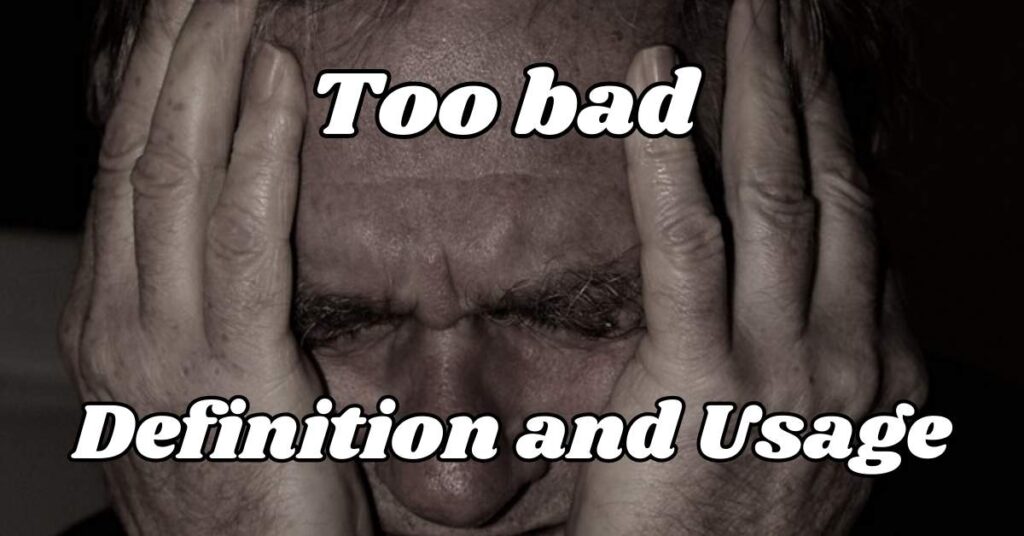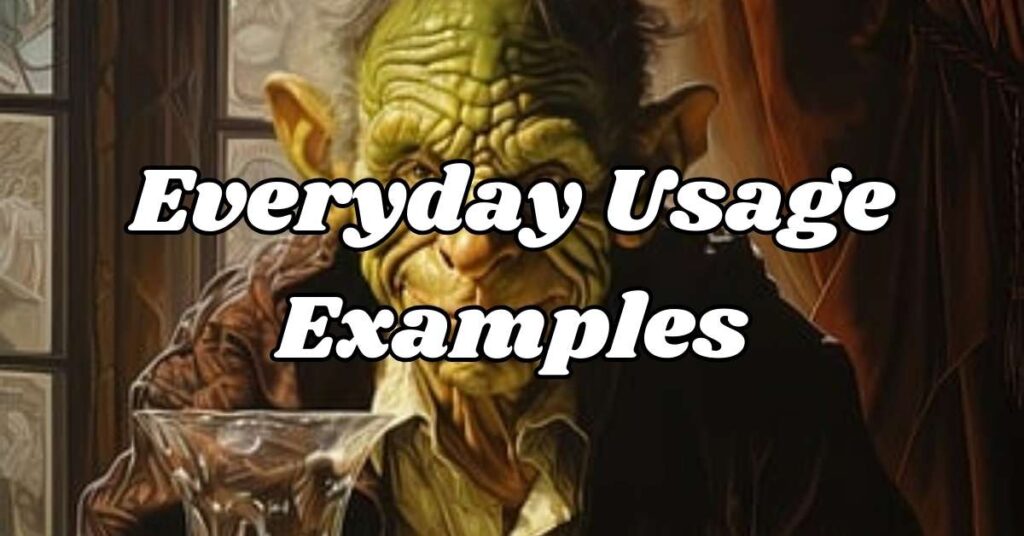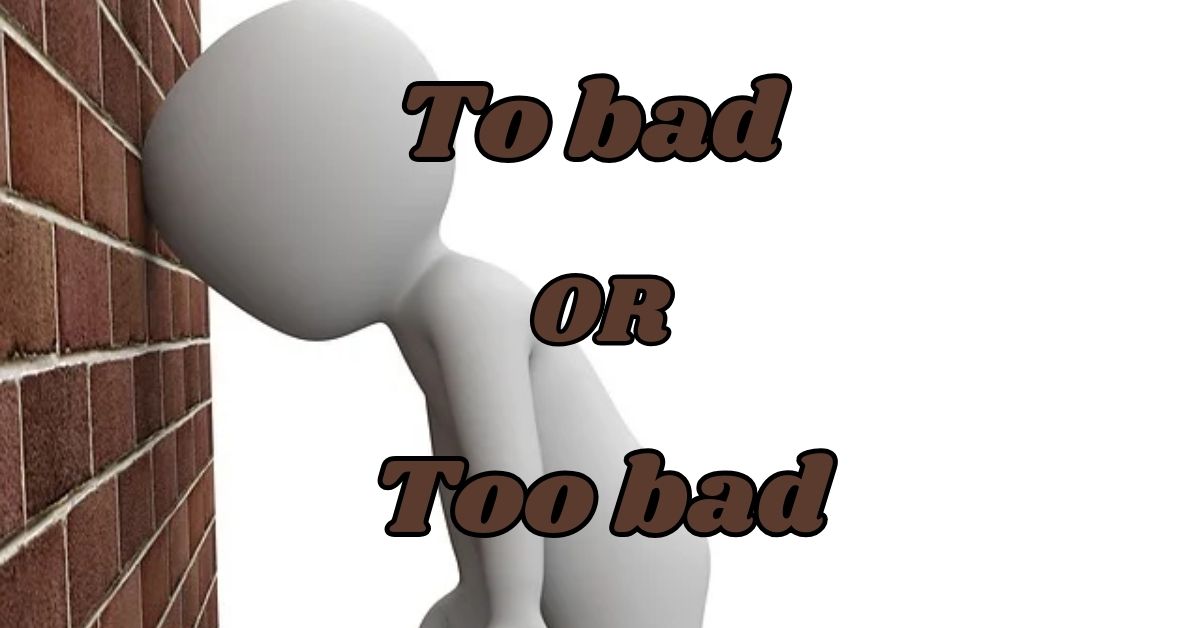To Bad or Too Bad: the confusion between these two phrases is a common pitfall in English communication. Many people mistakenly use “to bad,” which lacks any recognized meaning, instead of the correct expression, “too bad.”
This idiomatic expression conveys disappointment or sympathy in various contexts, making it essential for effective communication. Understanding the difference not only enhances your language skills but also helps you express feelings accurately.
In this article, we will explore the meanings, origins, and proper usage of “To Bad vs Too Bad,” ensuring you can confidently navigate conversations without falling into this common grammar mistake.
Quick Summary
When deciding between “To Bad or Too Bad,” the correct choice is always “too bad.” This phrase expresses disappointment or sympathy about an unfortunate situation. Using “to bad” is a common grammar mistake that can confuse listeners or readers.
Understanding the difference between these phrases is crucial for clear communication, helping you convey your feelings accurately in conversations and writing. Let’s explore this topic further!
Understanding To Bad or Too Bad

The phrase “too bad” is an idiomatic expression used to express disappointment or regret about a situation. For example, if someone misses an event, you might say, “It’s too bad you couldn’t make it.”
On the other hand, “to bad” does not have a recognized meaning in English. It often appears as a language confusion or grammar mistake when people mistakenly combine the preposition “to” with the adjective “bad.”
Where Does Too Bad Come From?
The phrase “too bad” has its roots in the English language’s evolution. Over time, it has become a common way to express feelings of disappointment or sympathy.
The word “too” serves as an adverb that intensifies the meaning of “bad.” This combination effectively conveys that something is not just bad but worse than expected.
Origins of the Too Bad
The phrase “too bad” combines “too,” indicating an excessive degree, with “bad,” which signifies a negative quality. This idiom expresses regret or indifference about a situation and has been used for centuries. Its origins likely trace back to Middle English, where “bad” was already established.
Depending on context, it can convey genuine sympathy, as in “It’s too bad about your accident,” or a dismissive attitude, like “Too bad you missed the deadline.”
Similar expressions include “That’s a shame” and “Oh well,” which also reflect disappointment or misfortune. Understanding this phrase enhances communication skills in both casual and formal settings.
To Bad: Definition and Usage

The phrase “to bad” is an incorrect expression that lacks a recognized meaning in English. It often arises from confusion between the preposition “to” and the adverb “too.” Using “to bad” can lead to misunderstandings, as it does not convey any clear sentiment or emotion.
Instead, it is essential to use “too bad” to express disappointment or sympathy accurately in conversations and writing.
To Bad Meanings
Since “to bad” is not a valid phrase in standard English, it does not have any established meanings. People may mistakenly use it when they intend to express regret or disappointment.
However, this incorrect usage can confuse listeners or readers, making it crucial to remember that “too bad” is the appropriate phrase for conveying such sentiments. Clarity in communication is vital.
To Bad Usage
Commonly, people misuse “to bad” when trying to articulate feelings of disappointment about a situation. This error often occurs in casual conversation or informal writing, where individuals may not pay close attention to grammar rules.
To avoid confusion and enhance communication skills, it’s important to replace “to bad” with the correct phrase, “too bad,” ensuring that your message is clear and easily understood.
Too Bad: Definition and Usage

“Too bad” is a widely recognized idiom in the English language used to express disappointment, regret, or sympathy about an unfortunate situation. It combines “too,” meaning excessively, with “bad,” signifying negativity.
Depending on the context, it can reflect genuine concern or even a dismissive tone. For example, “It’s too bad you missed the event” conveys regret, while “Too bad, better luck next time” may sound indifferent.
Too Bad: Explained
“Too bad” works by emphasizing the degree of negativity in a situation. The word “too” intensifies “bad,” making it more than just unfortunate it becomes excessively so.
This phrase is versatile and can be used in both formal and informal contexts to communicate feelings ranging from sympathy to mild indifference. Its flexibility makes it a staple in everyday conversations and written communication.
Usage of “Too Bad” in a Sentence
Using “too bad” in a sentence is straightforward and context-dependent. For instance, “It’s too bad the weather ruined our picnic” expresses disappointment about an external factor.
Alternatively, “Too bad you didn’t prepare for the test” might convey a slightly dismissive tone. This idiom can adapt to various scenarios, making it a useful expression for conveying emotions like regret, sympathy, or even mild sarcasm.
20 Points of the Phrase Too Bad
The phrase “too bad” can be used in various contexts:
- Expressing disappointment about missed opportunities.
- Conveying sympathy for someone’s misfortune.
- Indicating regret over decisions made.
- Describing unfortunate circumstances.
- Reflecting on unmet expectations.
- Acknowledging setbacks in personal goals.
- Commenting on the sad news.
- Discussing challenges faced by others.
- Expressing compassion in difficult situations.
- Sharing feelings about lost chances.
- Relating to friends during tough times.
- Consoling someone after a letdown.
- Responding to unfortunate events in pop culture.
- Using humor in light-hearted contexts.
- Offering comfort during hardships.
- Acknowledging mistakes made by oneself or others.
- Discussing regrets in professional settings.
- Reflecting on past experiences with sadness.
- Commenting on societal issues with empathy.
- Sharing collective disappointment with groups.
Synonyms of Too Bad
When looking for alternatives to express similar sentiments as “too bad,” consider these phrases:
- What a shame
- How unfortunate
- That’s regrettable
- That’s disappointing
- Such a pity
- A real letdown
- That’s sad
- That’s tough luck
- What a bummer
- That’s distressing
Side by Side Comparison
To clarify further, here’s a simple comparison:
| Phrase | Correctness | Meaning |
| To bad | Incorrect | No established meaning |
| Too bad | Correct | Expresses disappointment |
This table highlights why it’s crucial to use “too bad” instead of “to bad.”
Everyday Usage Examples

In daily conversations, “too bad” frequently appears in various contexts to express disappointment or sympathy. For example, someone might say, “It’s too bad you couldn’t join us for dinner,” highlighting regret over a missed opportunity.
Alternatively, a friend might comment, “Too bad the concert was canceled,” reflecting disappointment about an event. These examples illustrate how versatile the phrase is, allowing people to convey their feelings clearly and effectively in everyday situations.
To Bad Example
An example of incorrect usage is: “It was to bad that I missed the bus.” This sentence lacks clarity and correctness because it uses “to” instead of “too.” The proper phrase, “too bad,” would effectively express disappointment about missing the bus, conveying a clear sentiment.
Using “too bad” ensures that your message is understood, making it essential to avoid this common grammar mistake in both spoken and written communication.
Examples of “Too Bad” in Pop Culture
“Too bad” frequently appears in pop culture to express disappointment or sympathy. In the movie “Pulp Fiction,” Butch Coolidge, played by Bruce Willis, states, “That’s too bad,” after realizing he left his father’s watch behind.
In the TV show “Friends,” Chandler Bing often uses the phrase sarcastically in response to unfortunate events. Additionally, songs like “Bridge Over Troubled Water” by Simon & Garfunkel convey similar sentiments, highlighting the emotional weight of this common expression in various contexts.
Examples of How “Too Bad” Can Be Used in Different Contexts
The phrase “too bad” is versatile and can fit into various contexts, allowing speakers to express a range of emotions. Whether conveying indifference, sympathy, or regret, this idiomatic expression adapts to the situation at hand.
Understanding how to use “too bad” appropriately in different scenarios enhances communication skills and ensures that your message resonates with others effectively. Here are some examples of how “too bad” can be applied in casual, sympathetic, and regretful contexts.
In a Casual, Dismissive Context
In casual conversations, “too bad” can convey a dismissive attitude. For instance, if someone complains about missing a party, you might respond with, “Too bad you didn’t check the date.”
This response suggests indifference to their situation and implies that they should have been more attentive. Using “too bad” in this way can sometimes come off as slightly sarcastic or light-hearted.
In a Sympathetic Context
When expressing sympathy, “too bad” serves as a gentle acknowledgment of someone’s misfortune. For example, if a friend shares that they lost their job, you might say, “I’m sorry to hear that; it’s too bad you have to go through this.
” This usage conveys genuine concern and understanding while offering emotional support during difficult times.
In a Regretful Context
In situations where regret is felt, “too bad” effectively communicates disappointment. For instance, if someone missed an important event due to unforeseen circumstances, you could say, “It’s too bad you couldn’t make it to the wedding.”
This phrase expresses your disappointment about their absence while recognizing the unfortunate nature of the situation. It captures both empathy and regret in one simple expression
Tips to Avoid The Spelling Error

To ensure you use the correct phrase every time:
- Remember that “to” is a preposition while “too” is an adverb meaning excessively or very much.
- Practice using “too bad” in sentences until it feels natural.
- Read examples aloud; hearing them helps reinforce correct usage.
- Use mnemonic devices like remembering “two o’s for too much.”
- Seek feedback from friends or colleagues about your writing.
You May Also Like: Attornies or Attorneys: The Correct Spelling Explained
FAQs: To Bad or Too Bad
Do I say too bad or to bad?
You should say “too bad,” as it correctly expresses disappointment or sympathy about a situation.
Is it too correct or to correct?
The correct phrase is “too correct,” which means excessively accurate or precise.
What is slang for too bad?
Slang expressions similar to “too bad” include phrases like “what a bummer” or “that’s rough.”
What does “too bad” mean?
“Too bad” conveys disappointment or regret about an unfortunate situation, often reflecting sympathy or indifference.
What does “too bad” mean?
In essence, “too bad” signifies that something is excessively unfortunate, expressing feelings of sadness or regret about a specific event.
Conclusion
Understanding the difference between “To Bad or Too Bad” is essential for effective communication in English. Using the correct phrase, “too bad,” allows you to express disappointment or sympathy clearly and accurately.
Misusing “to bad” can lead to confusion and misunderstandings, undermining your message. By incorporating this knowledge into your conversations and writing, you enhance your language skills and ensure that your sentiments are conveyed appropriately.
Remember, choosing the right words makes all the difference in connecting with others and expressing your feelings effectively.
Related Post: Purposed vs Proposed: What’s the Difference?

